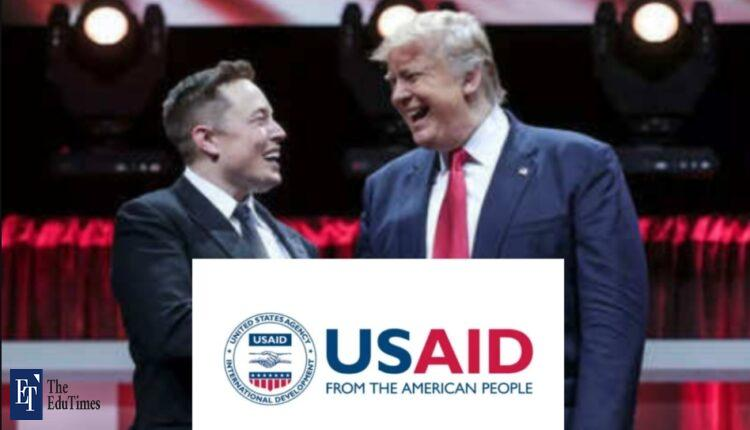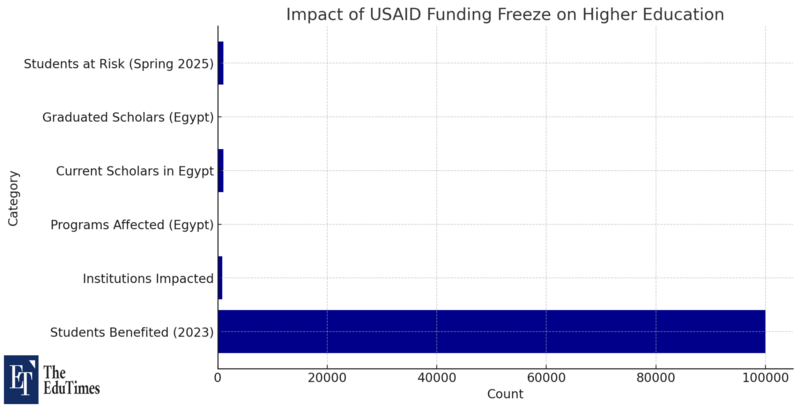Global Impact of Trump's USAID Shutdown
Input
Modified
The Global Response to the USAID Funding Freeze
Due to the international attention generated by the USAID funding embargo, other countries have stepped in to cover the shortfall. For students impacted by the freeze, the UK and the EU have launched emergency research funds and fellowships. In an effort to lessen the impact on Egyptian and African institutions, Canada and Japan are also looking into ways to increase the scope of their educational assistance programs. By providing more scholarships through the Belt and Road Initiative, China, which has been gaining sway over African higher education, has taken advantage of the freeze to fortify its educational alliances.

It is impossible to exaggerate the importance of USAID. By promoting stability and goodwill, its educational efforts not only enhance people's lives but also build ties across nations. In addition to undermining US soft power, cutting down USAID's educational programs would reverse years of development in developing countries. It is still hoped that long-term, sustainable funding methods may be found to continue the purpose of educational empowerment as governments and universities look for alternate options.
Since its founding in 1961, the United States Agency for International Development (USAID) has been a pillar of American foreign assistance, contributing significantly to global development and education. USAID has strengthened institutions, increased educational opportunities, and promoted sustainable growth in low- and middle-income nations through collaborations with universities and nonprofit groups.
Nearly 100,000 students benefited from USAID's higher education programs in 2023 alone, which had an impact on 830 institutions globally. Beyond traditional schooling, its programs support food security projects, workforce training, and research on climate change. One such example is the Feed the Future program, which addresses world hunger via research and education in partnership with more than 80 U.S. universities.
As part of a review of U.S. foreign aid spending, USAID is facing a 90-day budget freeze as of January 20, 2025, notwithstanding these contributions. Scholarship programs, research initiatives, and institutional assistance are all disrupted by this abrupt stop, placing academic institutions and thousands of students in a state of uncertainty. USAID has historically been a key player in workforce development, governance, and global health breakthroughs; the hiatus raises fears about setbacks in these areas.

Impact on African Higher Education
Through a number of programs, including the following, USAID has played a significant role in assisting African universities:
- Institutional collaborations between American and African institutions that promote developments in public health research, agricultural innovation, and climate research.
- Research partnerships that help African universities tackle regional and international issues.
- Training courses that improve university governance and research capacities for African scholars and administrators.
These programs are disrupted by the funding freeze, which might impede advancement in vital fields including agriculture, health, and climate change. Important repercussions include:
- Health Research Delays: Important health initiatives may be impacted by the stalling of projects pertaining to HIV/AIDS, malaria, and new diseases.
- Climate Research Setbacks: Delays in studies on climate adaptation, desertification, and droughts could make it more difficult for Africa to address climate challenges.
- Agricultural Innovation at Risk: Projects to create robust crops and environmentally friendly farming methods are insecure.
Furthermore, a lot of African students depend on funds provided by USAID in order to receive high-quality education. The aid freeze may result in:
- Fewer scholarship options for those wishing to attend American universities.
- A reduction in faculty interactions, which erodes scholarly partnerships.
- A change in the destinations of students, as more African students are looking at countries like China, the UK, Europe, and Canada.
Higher education in Africa will face long-term difficulties as a result of the aid embargo. African institutions must look for alternative funding methods and partnerships in order to carry out their crucial work in the absence of USAID sponsorship.
Impact on Egyptian Universities and Students
The worst disruption is likely to occur in Egypt, which receives the most U.S. money for higher education in Africa. Students seeking degrees in vital subjects including water management, energy, agriculture, and nursing have received support through the USAID-funded Scholars Initiative, which is run by the American University in Cairo (AUC) and other Egyptian universities. 788 students have benefited from the program since 2020, and 84 of them have already graduated.
But 1,077 students who are now enrolled at public and private universities, such as Cairo, Alexandria, Mansoura, Al Alamein International, Badr in Cairo, and the Arab Academy for Science, Technology & Maritime Transport, are directly impacted by the funding ban. Students who were scheduled to start classes in the spring of 2025 and Bridge Year students—those getting ready for their first academic year through English and study skills programs—are especially at risk. These youngsters' academic futures are uncertain in the absence of USAID assistance.
Foundational education initiatives and civil society organizations are also impacted by the funding suspension, in addition to institutions. Professional development projects and teacher training programs are among the six important educational initiatives that have been put on hold. There is a risk to the Teach-for-Tomorrow project and other capacity-building programs that educate government workers.

Response from Egyptian Institutions, Grassroots, and International Support Efforts
Egypt's Higher Education and Scientific Research Ministry acknowledged the gravity of the situation and declared on January 29, 2025, that the universities in question will pay the tuition for the remaining second semester for the impacted students. Students will be able to continue their education without facing immediate financial obstacles because of this promise.
In order to assist their students, Egyptian colleges have taken proactive steps. According to Ain Shams University, impacted scholarship recipients will receive full tuition reimbursement as long as they continue to meet academic requirements. Additionally, it pledged to maintain access to housing, student services, and academic resources.
In a same vein, AUC President Ahmad Dallal promised that the university would use budget cuts and fundraising to cover tuition, housing, and other educational costs for the Spring 2025 term. He did admit, though, that they are unable to provide USAID scholarships to new students who were hoping to enroll at the university due to budgetary limitations.
Students started the #Uncertain_Future_for_AUC_Students social media campaign in response to the funding suspension, demanding prompt resolutions. Increased efforts to find alternate financing sources have resulted from this demand.
In order to gather contributions from friends, instructors, and graduates, AUC has also established an Emergency Student Assistance Fund. To assist impacted students during their academic careers, the AUC Student Union has started a crowdfunding campaign and is actively looking for outside funding sources in partnership with the Office of Advancement.





















